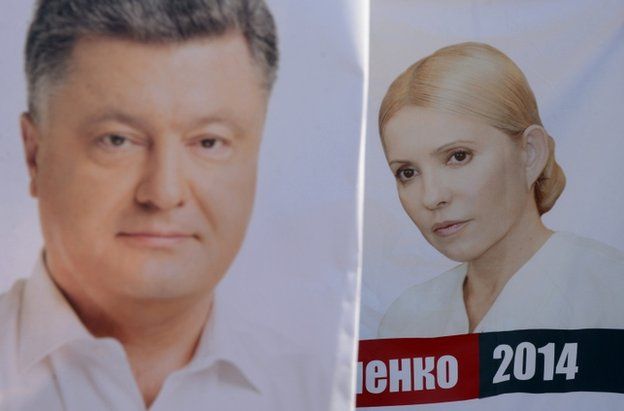Viewpoint: Ukraine's election turning point?
- Published

Ukraine's early presidential election on Sunday may prove a turning point for the troubled country. Andrew Wilson, an expert on Ukrainian affairs, explains why.
A few weeks ago, there were real doubts that Ukraine's election would even go ahead. But in Kiev at least, where I was until Monday, the optimists are beginning to think they will not only be held, but will prove to be the turning point in the crisis.
But first, what are the key things to look for on Sunday?
The first important question is how many are able and willing to vote. Notwithstanding Thursday's deadly attacks in Donetsk, the authorities in Kiev think they have contained the crisis in the east and even hope to conduct the voting in the parts of the separatist Donbass region that they control, which are currently the south and west of Donetsk and the north of Luhansk.
Crimea, on the other hand, looks like a lost cause, in voting terms at least, though the authorities will offer voting facilities just across the "border" in Kherson.
If enough voters turn out elsewhere in the east and south, and national turnout is something around 60%, this would a big victory for the authorities in Kiev.
The second criterion for success is that Russia does not use criticism of the process to increase its intervention once more. Complaints of fraud from any of the losing candidates would only play into Russia's hands.
Patchy record
Petro Poroshenko is the runaway favourite to win the election. He is currently polling more than 40% but if voters want to avoid a second round, they may give him the 50% he needs to win in the first round. A second round would get very dirty.
Mr Poroshenko is regarded as the most pro-European candidate but is one of Ukraine's notorious "oligarchs", the billionaire owner of the Roshen chocolates group, a TV station and several manufacturing plants.
His past record in government is patchy. He was one of the main sources of the feuding that led to the collapse of the first government after the Orange Revolution in 2005. His stint as foreign minister in 2009-10 was less controversial but largely achievement-free. Unlike the other oligarchs, however, he came off the fence early to back the protesters in Kiev this time around.
He has yet to launch his own political party, however, and he has only a handful of MPs in parliament. The current constitution formally limits his power but he will ignore that, as there have been so many questions about the legitimacy of the Ukrainian political system since the uprising in February.
Parliament chooses the government but Mr Poroshenko will try to broaden the current coalition. If he fails, he may have to push for new parliamentary elections to get round the obstruction of former supporters of President Viktor Yanukovych.
Mr Poroshenko may rush to complete the Association Agreement with the EU. While the political parts were signed by the interim government in March, the trade parts were put off until after the election so that someone with authority could handle the potential controversy.
Ukraine could try and do so on 27 June, when the EU has brought forward the date for signing similar agreements with Moldova and Georgia. Russia's reaction is unpredictable - whether it launches a fresh round of economic pressure may depend on whether the general situation is going its way.
The campaign of former Prime Minister Yulia Tymoshenko has failed to take off. Since her release from prison, she has struggled to catch up with the momentous changes in Ukraine since her imprisonment on trumped-up charges in 2011. She has campaigned like an old-style politician, making populist promises and doing deals with shady figures from the old regime.
Far-right myth
The election should at least explode the myth of a rising tide of extremist Ukrainian nationalism. Both Oleh Tyahnybok, who leads the right-wing Svoboda party that is the junior partner in the current government, and Dmytro Yarosh, the leader of the Right Sector movement that figures so prominently in Russian propaganda, will probably only score in the low single figures.
Oleh Lyashko, who has links to the old regime, may do slightly better due to his recent publicity stunts.
An election without major incident would be an achievement in itself, but is only a prelude to further troubles. The most pressing question is the security situation in the east. Kiev's strategy is to contain the separatists in the regions controlled by the literal and metaphorical "family" of Mr Yanukovych, and then try to cut off the flow of funds.
After the poor performance of Ukrainian forces at the start of the conflict, the government has fast-tracked volunteers into a National Guard under the minister of the interior and new battalions under the ministry of defence.
These new forces mainly man the containment checkpoints, while the regular army is used for more proactive tasks. Scarce professional security forces (the SBU) are currently being held back.
In the last week, local oligarch Rinat Akhmetov, who controls the local steel industry, has finally come off the fence and backed a strike against the anarchy unleashed by the separatists.
Mr Akhmetov and other oligarchs are funding the new pro-government forces. But relying on oligarchs has its costs. On their home territories they are acting like medieval barons, and in Kiev they are blocking key reforms.
The IMF loan of $15bn (£9bn; 11bn euros) has put off the threat of bankruptcy for now but the Maidan protests were all about changing the system, and there is little evidence of that so far.
Andrew Wilson's book The Ukraine Crisis will be published by Yale this summer.